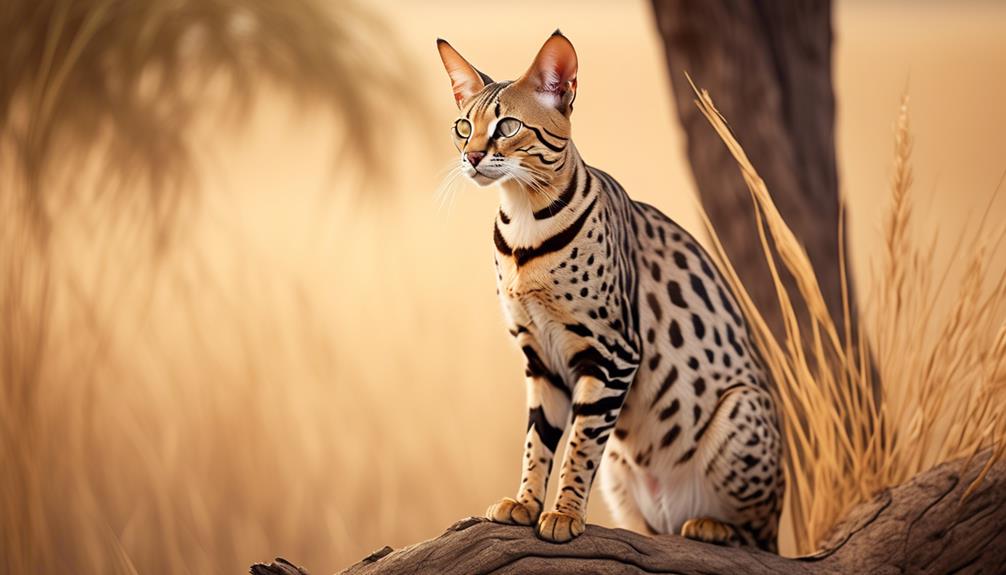
The Savannah cat is a fascinating breed that combines a domestic cat’s elegance with a serval’s wild allure.
Originating from the selective breeding of these two distinct species, the Savannah cat possesses unique characteristics that make it stand out from other feline breeds.
From its striking coat colors to its playful and adventurous nature, the Savannah cat is a captivating companion.
However, there is much more to discover about this breed, including its size, lifespan, and care requirements.
So, if you’re curious to learn more about the captivating world of Savannah cats, buckle up and prepare to embark on a journey of knowledge and discovery.
Key Takeaways
- Savannah cats are a medium to large breed with short, dense coats in various colors and patterns, including black, brown, and silver.
- They are known for their active and adventurous nature and athletic ability, which allows them to jump high and enjoy activities like walking on a leash and playing in water.
- Savannah cats are affectionate with their families and have a confident, alert, curious, and friendly temperament. They are also known for their playful nature and sense of humor.
- Proper care for Savannah cats includes regular brushing, dental hygiene, mental stimulation through toys and interactive games, and providing a safe environment through a large outdoor enclosure or keeping them indoors. Regular veterinary check-ups, vaccinations, and parasite prevention are also essential for their well-being.
Origin of the Savannah Cat
The Savannah cat, a unique and captivating breed, originated in the United States through crossbreeding a domestic cat and a serval.
This fascinating hybrid was developed by breeders Patrick Kelly and Joyce Sroufe, who were determined to create a feline companion with a serval’s wild appearance and a domestic cat’s temperament.
The breed was further refined by incorporating other breeds such as Bengals, Egyptian Maus, Oriental Shorthairs, and domestic shorthairs.
The result is a medium to large-sized cat with a short, dense coat that is spotted or marbled in various colors, including black, brown, and silver.
The Savannah cat’s impressive appearance and active and adventurous nature have made it a popular choice among cat enthusiasts worldwide.
See another cat breed profile.
Scottish Fold Cat Breed
Size and Breed Group
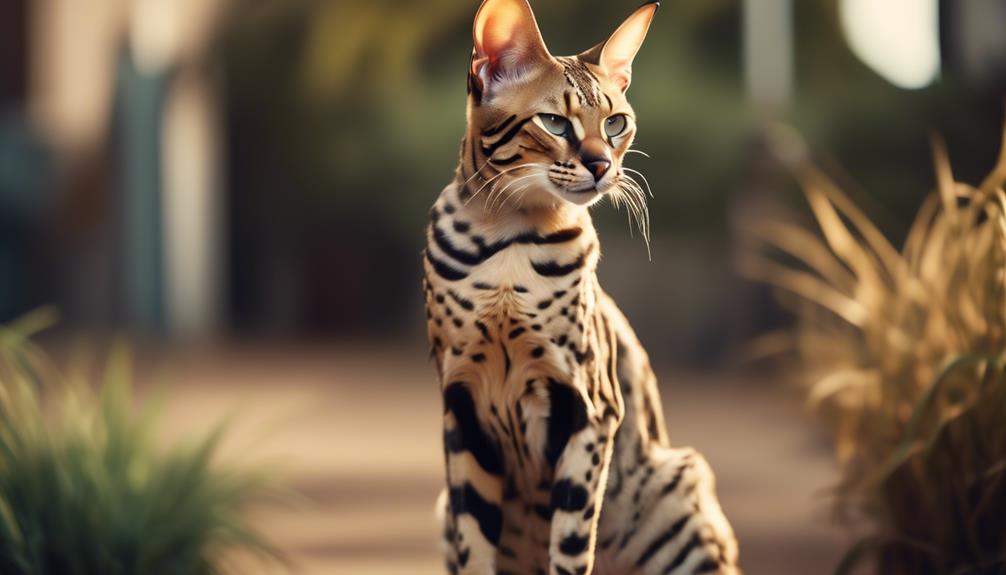
Savannah cats belong to the domestic shorthair breed group and are known for their medium to large size.
They have a distinctive appearance: a tall and lean body, slightly longer back legs, and a triangular head with large, broad ears and medium-sized eyes.
To provide a visual representation of the size range of Savannah cats, here is a table showcasing the size of different generations:
| Generation | Size |
|---|---|
| F1 | Large |
| F2 | Large |
| F3 | Medium to Large |
| F4 | Medium to Large |
As seen in the table, the size of Savannah cats can vary depending on the generation. From F1 to F4, they can range from large to medium to large.
It is important to note that these sizes are general guidelines, and individual cats may vary slightly.
Lifespan and Coat Characteristics
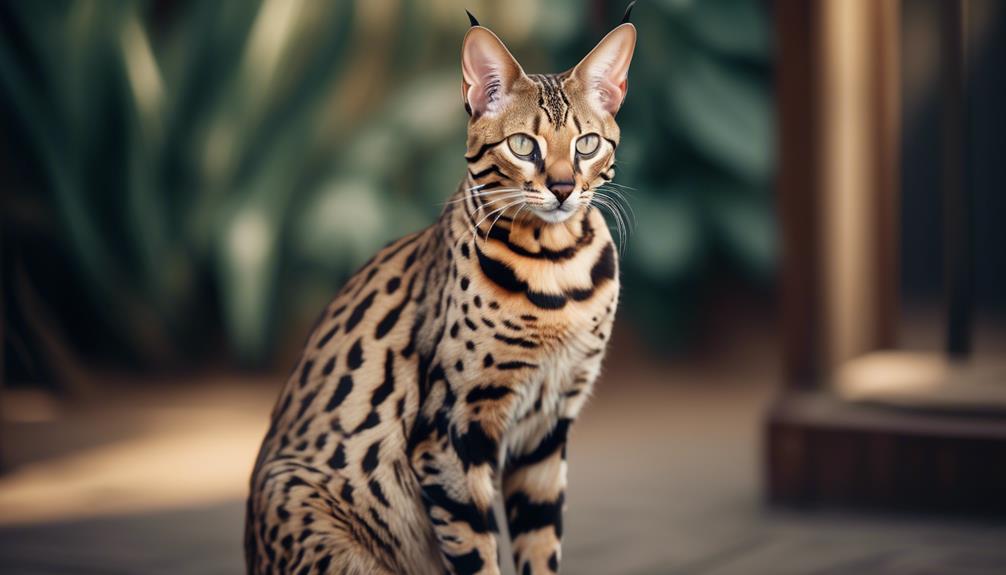
With an average lifespan of 12 to 20 years, Savannah cats showcase a striking combination of distinctive coat characteristics.
Their short, dense coat can be spotted or marbled, coming in a variety of colors such as black, brown, and silver.
These cats have solid markings on golden, cream, sandy, or white backgrounds; some may even have marble patterns or non-standard colors.
The Savannah cat also has a triangular head with large, broad ears and medium-sized eyes.
Their tall and lean body and slightly longer back legs give them an athletic appearance.
Regular grooming, including brushing to remove dead hair and dental hygiene, is essential to maintain their coat’s health and appearance.
Development and Breeders
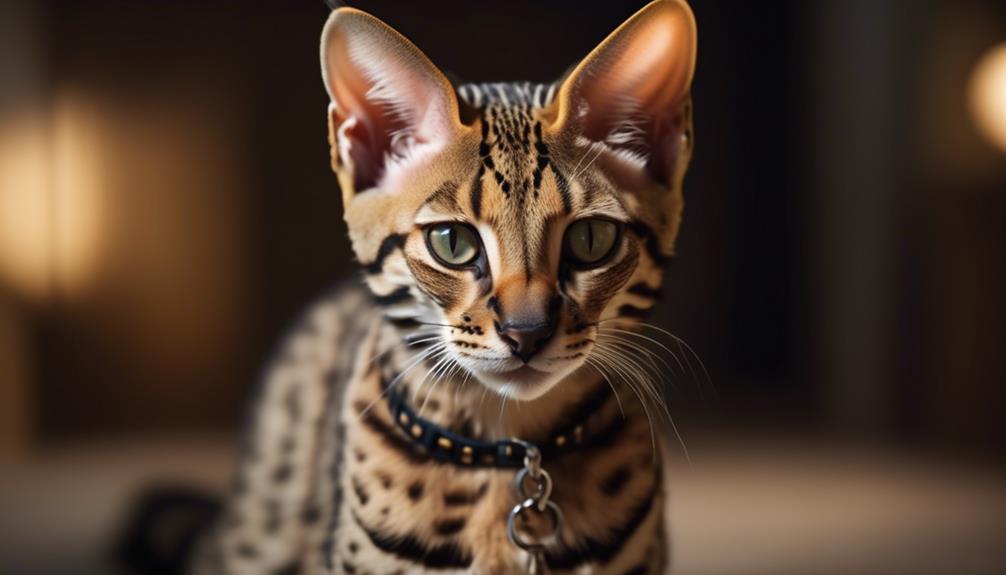
Having explored the lifespan and coat characteristics of Savannah cats, it is essential to now delve into the fascinating development of this breed and the dedicated breeders behind its creation.
The Savannah cat breed was developed by crossing a domestic cat with a serval, a medium-sized wild African cat.
Patrick Kelly and Joyce Sroufe are the breeders responsible for creating the Savannah cat.
They worked tirelessly to combine breeds, including Bengals, Egyptian Maus, Oriental Shorthairs, and domestic shorthairs, to produce a unique and distinctive breed.
The breed has come a long way since its inception and has gained recognition and popularity.
The International Cat Association (TICA) registered the Savannah cat breed in 2001 and granted it championship status in 2012.
The development of the Savannah cat is a testament to the dedication and passion of its breeders.
Contributing Breeds and Outcrossing
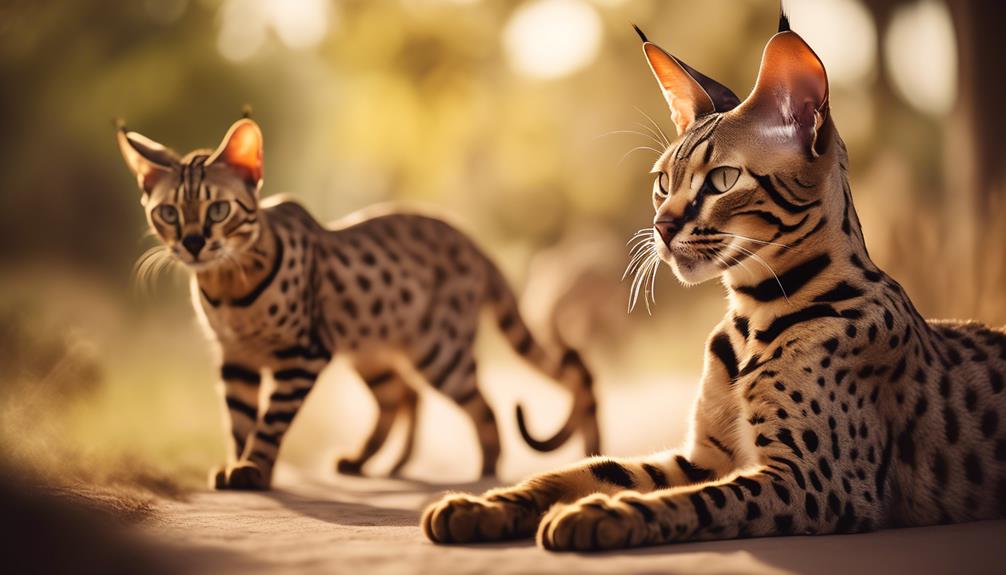
The development of the Savannah cat breed involved the intentional crossing of various domestic breeds, including Bengals, Egyptian Mau’s, Oriental Shorthairs, and domestic shorthairs.
This selective breeding aimed to create a domestic cat with the exotic appearance of a serval.
The Bengal breed contributed its distinctive spotted coat pattern and energetic nature, while the Egyptian Mau brought striking coat colors and elegant physique.
Oriental Shorthairs added to the breed’s sleek body shape and expressive eyes, while domestic shorthairs helped diversify the gene pool and ensure the breed’s health and temperament.
Outcrossing, introducing new bloodlines, is no longer permitted in the breed’s official standards.
The contribution of these diverse breeds has resulted in the creation of the unique and captivating Savannah cat.
Registration and Championship Status
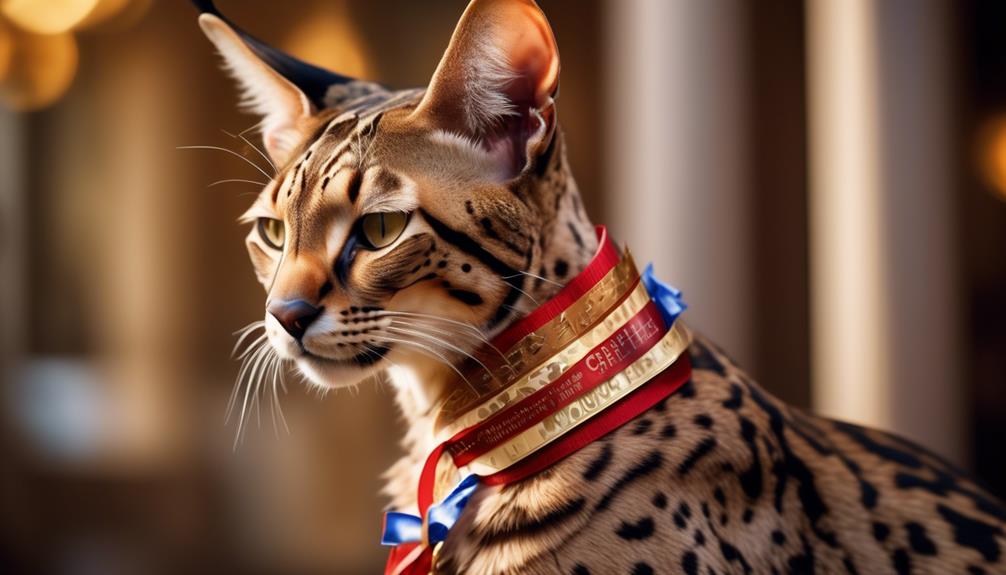
Savannah cats were officially recognized and registered by TICA (The International Cat Association) in 2001, and they were granted championship status in 2012.
This recognition and status mean Savannah Cats can now compete in TICA shows and earn championship titles.
TICA is one of the world’s largest and most respected cat registries, and their recognition of the Savannah breed has helped establish its credibility and popularity.
Championship status also indicates that the breed has met specific standards and characteristics set by TICA, including their appearance, temperament, and overall health.
This recognition and status have contributed to the growing recognition and acceptance of Savannah cats as a unique and desirable breed among cat enthusiasts and pet owners.
Affectionate Nature and Shedding
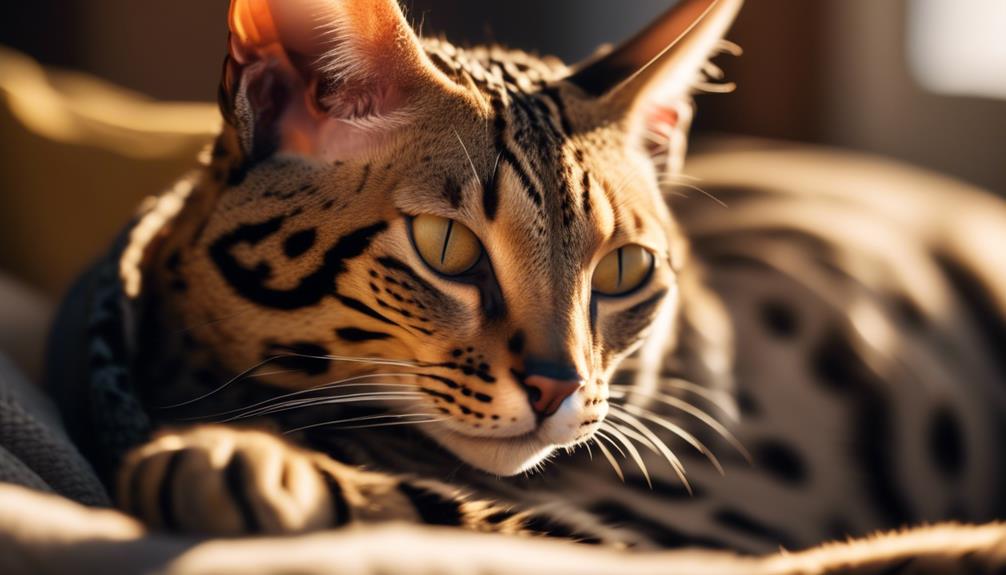
Savannah cats are known for their affectionate nature and minimal shedding.
Here are three key characteristics that make them stand out:
- Bonding with their families: Savannah cats strongly connect with their owners and enjoy spending quality time with them. They are known to be loyal and loving and enjoy being part of the family.
- Low shedding: Unlike many other cat breeds, Savannah cats have a short, dense coat that sheds very little. This makes them an excellent choice for individuals allergic to cat dander or who prefer a cleaner home environment.
- Easy grooming: Savannah cats require minimal grooming due to their short coats. Regular brushing to remove dead hair and distribute skin oils is usually sufficient to keep their coat in good condition.
These characteristics make Savannah cats popular for those seeking a loving and low-maintenance feline companion.
General Health and Playfulness
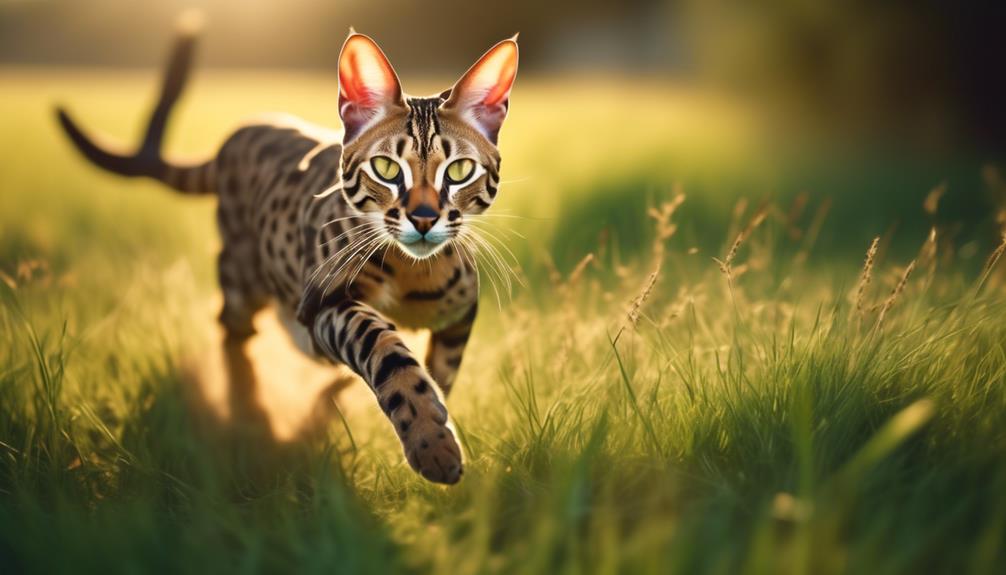
With their affectionate nature and minimal shedding, Savannah cats possess robust general health and inherent playfulness.
These cats are known for their high energy levels and love for playtime. They enjoy interactive games, such as chasing toys or playing fetch.
Their athletic bodies allow them to jump to impressive heights, and they can often be found exploring their surroundings with curiosity and confidence.
Savannah cats also have a reputation for their sense of humor and playful antics, keeping their owners entertained.
Providing them with plenty of mental and physical stimulation is important to keep them happy and engaged.
Regular exercise and playtime are essential for their well-being and prevent boredom-related behaviors.
Vocalization Tendency and Activity Level
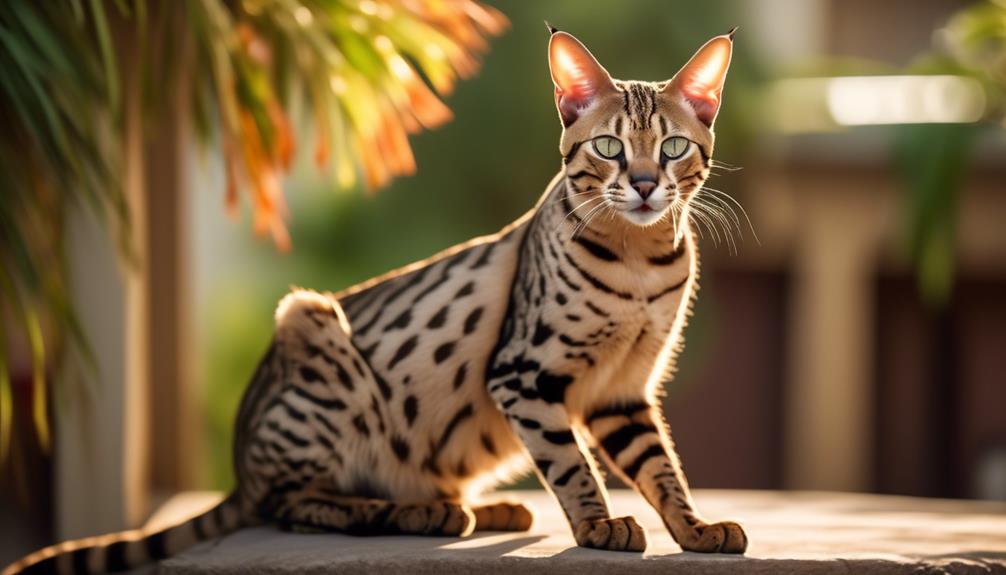
Vocalization tendencies and activity levels are important aspects to consider when understanding the behavior of Savannah cats.
Here are three key points to know about these characteristics:
- Vocalization Tendency: Savannah cats are known to be highly vocal. They have various vocalizations, including chirping, hissing, and even mimicking human sounds. Their expressive nature makes them excellent communicators with their owners.
- Activity Level: Savannah cats are incredibly active and energetic. They have a natural curiosity and love to explore their surroundings. Providing plenty of mental and physical stimulation is essential to keep them happy and prevent boredom. Interactive toys, puzzle feeders, and regular play sessions are recommended.
- High Energy Requirements: Due to their high activity levels, Savannah cats require a lot of exercise. They enjoy interactive playtime and benefit from having access to outdoor spaces or large enclosures where they can burn off energy. Regular exercise helps prevent behavioral issues and promotes overall well-being in these active felines.
Athleticism and Love for Water
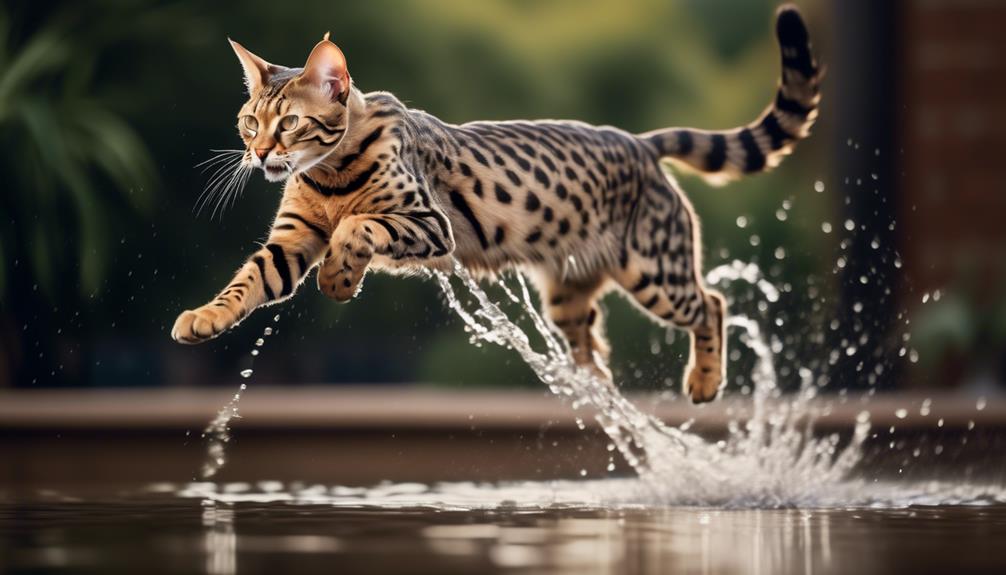
When considering the behavior of Savannah cats, it is essential to acknowledge their exceptional athleticism and affinity for water.
These felines possess a natural agility and grace that allows them to engage in various physical activities.
Their athletic bodies enable them to jump to heights and explore their surroundings with unmatched energy.
Additionally, Savannah cats have a unique love for water, which sets them apart from other domestic cat breeds.
They enjoy playing, splashing, and even swimming in water, making bath time or encounters with water sources a delight.
This love for water is believed to stem from their serval ancestors, known to be skilled swimmers.
Therefore, for owners of Savannah cats, providing ample opportunities for physical exercise and water-related activities is vital to keep these active and adventurous felines engaged and happy.
Personality Traits and Sense of Humor
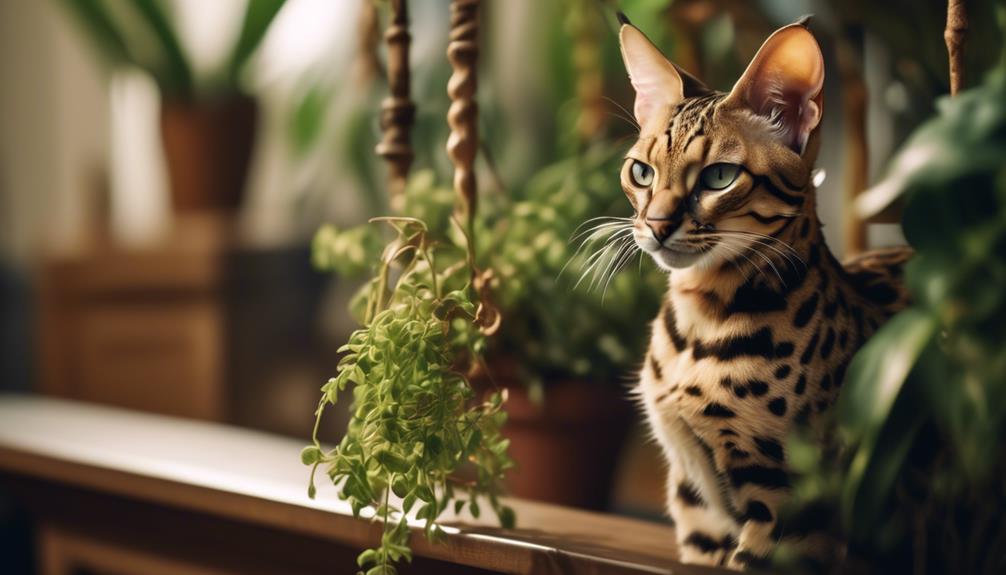
Savannah cats are known for their distinctive personality traits and a delightful sense of humor.
Here are three fascinating aspects of their personality that make them truly unique:
- Playfulness: Savannah cats have a natural inclination for playfulness, making them entertaining companions. They enjoy interactive games, puzzles, and toys that challenge their intelligence and agility. Their mischievous antics will keep you entertained for hours.
- Curiosity: These felines have an insatiable curiosity about the world around them. They love exploring their environment, investigating every nook and cranny. Be prepared for their boundless energy and constant need to discover new things.
- Social Nature: Savannah cats are known to be highly pleasant and friendly. They form strong bonds with their human family members and enjoy being involved in their daily activities. Their affectionate nature and ability to bond with their humans make them a joy to be around.
With their playful nature, curiosity, and social tendencies, Savannah cats will surely bring laughter and joy into your life.
Care Tips and Considerations
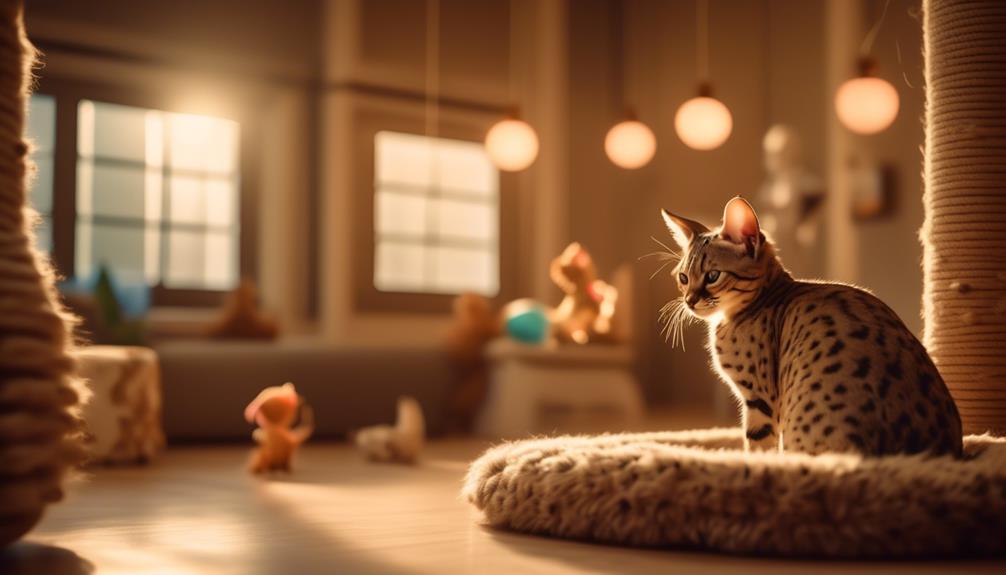
With their unique personality traits in mind, it is essential to understand the care tips and considerations when owning a Savannah cat.
These cats require regular brushing to remove dead hair and distribute skin oils. Dental hygiene is also crucial to prevent periodontal disease.
Providing interesting toys and interactive games is essential for their mental stimulation.
Consider a large outdoor enclosure or keep them indoors to prevent dangers. It is important to check local laws regarding hybrid or exotic animal ownership.
Regular veterinary check-ups, vaccinations, and parasite prevention are necessary for their well-being.
Proper nutrition and exercise should be provided for their overall health.
Below is a table summarizing the care tips and considerations for owning a Savannah cat:
| Care Tips and Considerations |
|---|
| Regular brushing |
| Dental hygiene |
| Interesting toys and games |
| Outdoor enclosure or indoors |
| Check local laws |
| Regular veterinary check-ups |
| Vaccinations and parasite prevention |
| Proper nutrition and exercise |
Coat Colors, Grooming, and Physical Features
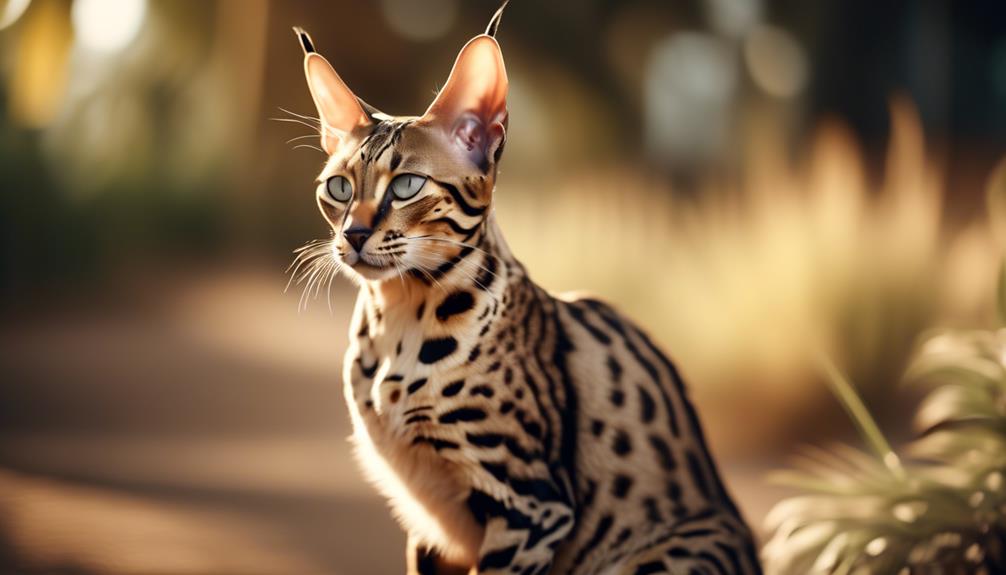
The coat colors, grooming, and physical features of Savannah cats contribute to their unique and striking appearance.
Here are three key aspects to consider:
- Coat Colors: Savannah cats come in various colors and patterns, including black, brown, and silver spotted tabby. They may also have solid markings on golden, cream, sandy, or white backgrounds. Some Savannah cats even have marble patterns or non-standard colors, adding to their individuality.
- Grooming: Savannah cats have short, dense coats that require regular brushing to remove dead hair and distribute skin oils. This helps to keep their coat healthy and shiny. Additionally, dental hygiene is essential to prevent periodontal disease, so regular teeth brushing or dental treats are recommended.
- Physical Features: Savannah cats have a triangular head with large, broad ears and medium-sized eyes. They possess an athletic body, allowing them to excel in high jumps. Their tall and lean stature and slightly longer back legs give them a distinct and elegant appearance.
Frequently Asked Questions
Are Savannah Cats Suitable for Families With Young Children?
Savannah cats can be suitable for families with young children due to their affectionate nature, high playfulness, and friendly temperament.
However, it is essential to supervise interactions and teach children how to handle and respect the cat properly.
How Much Exercise Do Savannah Cats Require daily?
Savannah cats require a significant amount of exercise daily to meet their high energy levels.
Engaging them in interactive play, providing toys, and allowing outdoor exploration or walks on a leash can help fulfill their exercise needs.
Can Savannah Cats Be Trained to Walk on a Leash?
Yes, Savannah cats can be trained to walk on a leash.
They are brilliant and adaptable, making them receptive to leash training.
With patience and positive reinforcement, they can enjoy outdoor walks while safely under control.
What Is the Average Weight Range for Adult Savannah Cats?
The average weight range for adult Savannah cats varies depending on their generation.
Generally, F1-F3 Savannahs can weigh 10-20 pounds, while F4-F7 Savannahs tend to weigh 8-12 pounds.
Do Savannah Cats Have Any Specific Dietary Requirements?
Savannah cats do not have any specific dietary requirements. However, providing them with a balanced and nutritious diet is important to support their overall health and well-being.
Consulting with a veterinarian is recommended for personalized dietary recommendations.
Conclusion
In conclusion, the Savannah cat is a unique and fascinating breed that combines a domestic cat’s characteristics with a serval’s appearance and athleticism.
They make great companions for families with their active nature, affectionate disposition, and love for water.
Proper care involves regular grooming, mental stimulation, and a safe environment.
Responsible adoption and breeding practices should be encouraged to ensure the well-being of these remarkable felines.




